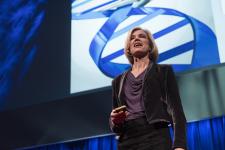Aggregated News

Geneticist Jennifer Doudna, 52, is waiting for the day when she reads about the first baby whose genes have been altered in a lab. “It’s only a matter of time,” says the professor of chemistry and molecular biology at the University of California, Berkeley—within the next 10 years, she thinks, or even sooner. The idea excites and worries her because she has been so deeply involved in the technology that would make it possible.
Called Crispr-Cas9, it is a way to edit DNA and potentially remove and replace genes for certain diseases, characteristics and capabilities. As scientists have become more comfortable with the technology, its reach has grown—as have ethical concerns about how it may be used.
In 2014, Chinese scientists successfully produced monkeys that had been genetically modified at the embryonic stage using Crispr-Cas9. And last year, another team of researchers in China published a paper about their experiments editing genes in human embryos. (The researchers tried but failed to repair a gene that causes a hereditary blood disease.) Last month, a U.K. regulatory group approved research ...



